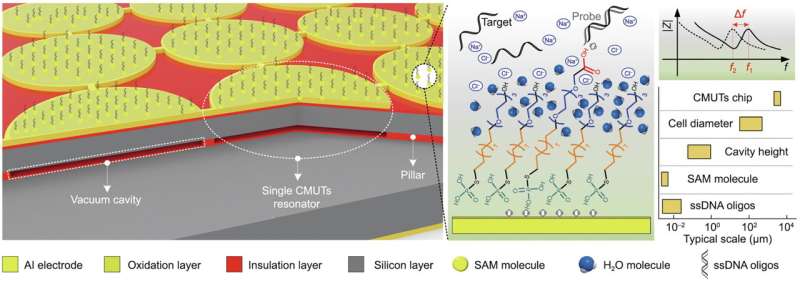This article has been reviewed according to Science X's editorial process and policies. Editors have highlighted the following attributes while ensuring the content's credibility:
fact-checked
proofread
Novel biosensor offers enhanced DNA detection specificity

Researchers have successfully demonstrated a novel biosensor capable of detecting single-stranded DNA oligonucleotides with high specificity without needing external labels. This advancement paves the way for more accessible and efficient point-of-care diagnostics. The study, reported in Engineering, is titled "Development of an Integrated CMUTs-based Resonant Biosensor for Label-Free Detection of DNA with Improved Selectivity by Ethylene-Glycol Alkanethiols."
The biosensor in question is based on capacitive micromachined ultrasonic transducers (CMUTs), which have shown promise for developing miniaturized, high-performance biosensing platforms. However, previous CMUTs faced limitations due to inefficient functionalization, aggregation, and the requirement for an external high-voltage (HV) power supply.
The research team overcame these challenges by integrating a CMOS front-end interface with ethylene-glycol alkanethiols, which were used to functionalize the surface of the CMUTs. This approach significantly improved the selectivity of on-chip hybridization, as confirmed through fluorescence imaging technology.
The sensor array was characterized using a five-element lumped equivalent model, and a 4-mm2 application-specific integrated circuit (ASIC) chip was designed and developed through 0.18-μm HV Bipolar-CMOS-Double diffused MOS (DMOS) technology (BCD). The chip was able to generate on-chip 20V HV boosting and track feedback frequency under a standard 1.8 V supply, with a low total power consumption of 3.8 mW in continuous mode.
The study's results showed a detection sensitivity of 7.943 × 10−3 μmol∙ L−1∙Hz−1 over a concentration range of 1 to 100 μmol∙L−1. The successful deposition of self-assembled monolayers on aluminum electrodes using ethylene-glycol alkanethiols is also a first for CMUT technology, further enhancing the biosensor's selectivity.
This label-free biosensing technology operates under dry conditions and represents a significant step forward in the field of microfabricated CMUT arrays for health care diagnostics. With its compact design and internal HV supplier, this innovative biosensor promises to make DNA detection more accessible and convenient than ever before.
The implications of this research are vast, suggesting the potential for fully integrated on-chip DNA biosensing with CMUT technology. As the race towards more personalized medicine gains momentum, advancements like these are crucial in enabling rapid and accurate disease diagnosis and monitoring.
The label-free nature of the biosensor also reduces the cost and complexity associated with traditional labeling techniques, making it an attractive option for point-of-care applications.
The study's authors note that further research is needed to explore the biosensor's performance with a wider range of biomolecules and in more complex sample matrices. However, the current findings provide a strong foundation for the development of next-generation biosensors that are not only highly sensitive and specific but also user-friendly and cost-effective.
In an age where early detection is key to improving patient outcomes, this technology could be a game-changer. It may soon find applications in a variety of settings, from doctor's offices to remote health care clinics, where access to sophisticated diagnostic equipment is limited.
The successful demonstration of this microfabricated CMUT array with a 2 MHz frequency on CMOS electronics sets the stage for future advancements in the field of biosensors.
More information: Zhikang Li et al, Development of an Integrated CMUTs-based Resonant Biosensor for Label-Free Detection of DNA with Improved Selectivity by Ethylene-Glycol Alkanethiols, Engineering (2024). DOI: 10.1016/j.eng.2023.12.015
Provided by Engineering



















